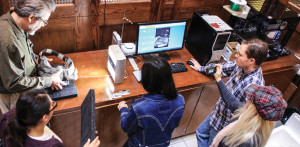
As our nation and campuses become more diverse, academic librarians are well positioned to play an important role in retaining underrepresented and nontraditional students at our institutions.
The University of Houston (UH) has more than 40,000 students from 137 nations. Among our undergraduates, 26.9% are Hispanic, 19.8% are Asian, 10.2% are African American, and 9.8% are international. Many of them are first-generation or nontraditional students.
UH is changing from a commuter school to a flagship destination research university, and student success is a top priority. Campus initiatives like “UH in 4,” which locks in tuition rates for students committed to following a four-year graduation plan, provide incentives and support for students. But with our six-year graduation rate currently at 48.1% and four-year graduation rate at 22.7%, we need more ways to help students.
That’s where our library stepped in.
Students who visit our library often ask, “Where are the books?” Indeed, with our library’s lower floors devoted to technology and meeting spaces, students rarely see our collections beyond the first floor’s leisure reading. If they don’t already know how to search the catalog and understand the configuration of the book stacks, they won’t find what they need.
For instance, books on study skills and academic success can be powerful tools for students struggling to adjust to university culture. But students first have to be able to find these books. Students who need these types of books the most can often feel the least comfortable navigating the stacks.
When we began thinking about this issue, our books on building study skills and academic success were spread across a wide range of call numbers. Now, after creating a collection that is placed on our high-traffic first floor, we have been able to increase these books’ visibility.
Not only have we pulled existing books related to academic success from their regular stacks, we reinforced the collection with Learning Support Services (LSS), a campus academic counseling and support unit, to find titles that speak to the diverse student groups it works with.
In addition to general titles that promote study skills, like Orientation to College Learning (Cengage, 2013), we purchased titles geared toward particular student populations, such as Getting Ahead as an International Student (Open University Press, 2009), The Adult Student’s Guide to Survival and Success (Practical Psychology Press, 2008), Studying with Dyslexia (Palgrave Macmillan, 2012), Finding Success as a Returning Veteran or Military Student (Prentice Hall, 2012), and The Latino Student’s Guide to College Success (Greenwood, 2001).
We also selected books to help students understand the skills and culture of specific academic disciplines, like Writing for Engineers (Palgrave Macmillan, 2005), Learning Skills for the Science Student (Brooks/Cole Publishing, 1994), and Business Degree Success: A Practical Study Guide for Business Students at College and University (Palgrave Macmillan, 2008).
Our partnership with LSS has extended beyond collection development; we publicize their information and workshop schedules each semester, and LSS sends students to our shelves to find particular resources.
With a 70% checkout rate in the first eight months, the data shows that if students encounter these resources, they will use them. Our greatest challenge is keeping books on the shelf.
As we continue to develop the collection with new funding, we are considering adding mental health and wellness books to support a well-rounded, balanced student. We encourage others to look at their unique campus populations to develop specialized collections that can contribute to student success for all.


